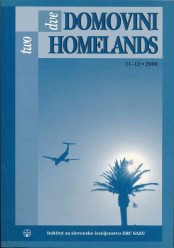The role of the ‘original’ area in the definition of nationality: the case of nine ‘Slovene’ emigrants and their descendants living in Mendoza, Argentina
Abstract
The connection of the group identity of a social group with the place in which it lives isformed through social relations and does not derive from the place itself. Emigrants and their descendants are constantly tom between the relations they have with the majority society and their relations within the emigrant community and the family; and thus they are constantly torn between the ‘original’ homeland and the new one. Attachment or affiliation to the ‘original’ area is closely linked to affiliation to an ‘original’ culture or ‘original’ ethnic identity, although the relationship is not always linear. It is usually difficultor impossible to differentiate between the milieu of place and culture, between feelings of territorial bonds or belonging and ethnic or national awareness.
Downloads
References
Južnič, S., 1987: Antropologija. Ljubljana: Fakulteta za družbene vede in D ržavna založba Slovenije, 341 str.
Kučan, A., 1996: D ejavniki nacionalne prostorske identitete v Sloveniji. D oktorska disertacija. Ljubljana: Biotehniška fakulteta, Inštitut za krajinsko arhitekturo.
Smith, A. D., 1991: N ational Identity. U niversity o f Nevada Press, 226 str.
Žigon, Z., 1998: Otroci dveh domovin: Slovenstvo v Južni Ameriki. Ljubljana: ZRC SAZU, 269 str.
Downloads
Published
How to Cite
Issue
Section
License

This work is licensed under a Creative Commons Attribution-NonCommercial-NoDerivatives 4.0 International License.
Authors guarantee that the work is their own original creation and does not infringe any statutory or common-law copyright or any proprietary right of any third party. In case of claims by third parties, authors commit their self to defend the interests of the publisher, and shall cover any potential costs.
More in: Submission chapter





